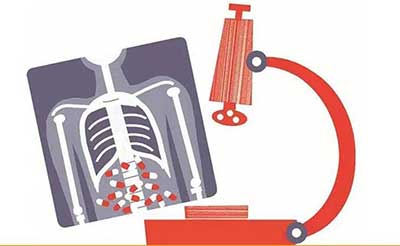Relevance: GS-2:Welfare schemes for vulnerable sections of the population by the Centre and States and the performance of these schemes; Issues relating to development and management of Social Sector/Services relating to Health
Key Phrases: Tuberculosis, socio-economic price, Ending TB in India, gender-responsive approach to TB, Nikshay Poshan Yojana
Why in News?
- As India steadily steers its way through the pandemic, it must foreground a disease which has been impacting our country for years, and disproportionately affecting women – Tuberculosis.
Key Points:
- Tuberculosis (TB) is caused by bacteria (Mycobacterium
tuberculosis) that most often affect the lungs.
- TB is spread from person to person through the air.
- About one-quarter of the world's population has a TB infection, which means people have been infected by TB bacteria but are not (yet) ill with the disease and cannot transmit it.
- Tuberculosis is curable and preventable.
- Approximately 1.5 million people died worldwide from TB in 2020 (as per WHO).
- In India, the TB case fatality ratio increased from 17 per cent in 2019 to 20 per cent in 2020.
Impact of TB on women:
While both men and women suffer the consequences of this debilitating disease, women patients pay a much steeper socio-economic price.
- According to a joint report (2010-13) of the Registrar General of India and the Centre for Global Health Research, TB was the fifth-leading cause of death among women in the country, accounting for nearly 5% of fatalities in women aged 30–69.
- From social ostracisation and lack of family support to the negative impact on marital prospects, women absorb the repercussions of TB beyond the clinical metrics.
- Stigma also acts as a strong deterrent when it comes to health-seeking behaviour.
Fewer women, therefore, get included in the available cascade of care for TB.
Need:
There needs to be a multi-pronged approach to removing these barriers and bring equitable access to TB care.
- Elected representatives need to come together more to highlight
the issue at all relevant forums and spaces. They should carry out
reviews of the TB programme in our respective districts and communities.
- Moreover, steps should be taken so that these meetings see an increased participation of women leaders from all walks of life in the community going forward.
- There is an urgent need to strengthen counselling networks for women
patients and their families.
- Irrespective of where the patient seeks care – public or private sector – build the capacity of healthcare workers to educate the patient’s family about the importance of providing her a supportive environment during the course of her treatment.
- Government should ensure that the nutritional needs of women are
being met.
- Deep-seated patriarchal notions warp the place of a woman in the family: Women are often the last ones to eat, preferring to feed elders, husbands, and children first.
- Undernutrition is a serious risk factor for TB and research indicates such risks are higher for women.
- Additionally, inter-departmental coordination needs to be strengthened ,
wherein the Public Distribution System can explore appropriate linkages with
relevant departments of the MoHFW and even include a protein-rich
diet for TB patients.
- This will ensure that patients, especially women, have access to a balanced diet.
- At a community level, government must amplify accurate TB messaging and showcase how gender plays a role in determining the course of action on the ground.
Steps taken:
- In 2018, Government envisioned ending TB in India by 2025, five years ahead of the global Sustainable Development Goal (SDG) target of 2030.
- To reach the goal of a TB Mukt Bharat, WHO India is preparing to
implement Project GATIMAN to augment technical assistance in the areas
of public private partnership, TB surveillance, knowledge management,
implementation research, drug-resistant TB, laboratories, TB infection
management, and advocacy and communications across states and UTs.
- Additionally, WHO India has identified and adopted 100 aspirational, difficult-to-reach, and neglected districts for ending TB.
- In 2019, the Health Ministry-Central TB Division developed a
national framework for a gender-responsive approach to TB in India.
- The document takes cognisance of the challenges faced by women in accessing treatment and offers actionable solutions. Conversations on this issue need to be further elevated at a national level.
- In December 2021, a parliamentary conference on ‘Women Winning
Against TB’ was organised by the Ministry of Women and Child Development
where gender-responsive policy interventions were discussed.
- The Vice-President of India urged states to take proactive steps such as ensuring nutritional support to women and children and the doorstep delivery of TB services, especially for women from socio-economically weaker backgrounds.
- Government, through Nikshay Poshan Yojana, has effectively
provided a monthly benefit of Rs 500 to enable a nutritious diet for TB
patients in the last few years.
- For the 2020 cohort, the total amount paid under NPY via DBT has been over Rs 200 crore.
Nikshya Poshan Yozana
- It is centrally sponsored scheme under National Health Mission (NHM), financial incentive of Rs.500/- per month is provided for nutritional support to each notified TB patient for duration for which the patient is on anti-TB treatment. Incentives are delivered through Direct benefit transfer (DBT) scheme to bank accounts of beneficiary.
Conclusion:
- The world celebrates Women’s Day in March and spotlights women’s issues in society. However, it is time to revisit notions of what constitutes a “women’s issue” and confront such gender constructs. Especially in the context of public health, challenges faced by women aren’t challenges that only women have the obligation to resolve. These are universal problems that must transcend gender binaries. Eliminating TB is one such challenge and while policy mechanisms and political will to end TB exist, it’s a question of further refining our implementation strategies on the ground, as a collective.
Source: Indian Express
Mains Question:
Q. Only when equitable solutions are offered to vulnerable sections of society will we be able to realise the dream of TB-Mukt Bharat. Discuss.



















